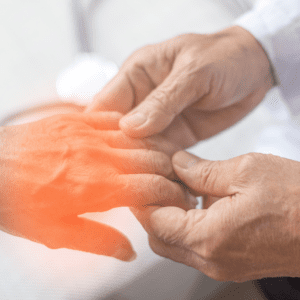
Posted 5 years ago
Natural Approaches to Chemotherapy-Induced Peripheral Neuropathy
One of the unfortunate possible long term side effects of receiving chemotherapy drugs is a condition called chemotherapy-induced peripheral neuropathy or CIPN. It is estimated that 30-40 % of patients that receive chemotherapy will have some degree of CIPN. Chemotherapy drugs can cause injury to nerve endings which typically lead to symptoms of burning, numbness, tingling, abnormal sensations and/or pain in the hands and feet. In more severe cases it can cause issues with balance, walking and use of one’s hands. This can be a very debilitating condition for those who are affected by it.
The conventional approach to managing neuropathy is to prescribe nerve medications like gabapentin or pregabalin. These medications can help decrease the severity of pain but typically they do not improve sensation. Physical therapy is also a standard treatment that is beneficial in decreasing symptoms of CIPN by improving both pain and function in the affected areas.
There are also a number of complimentary therapies that have shown promise in helping patients who suffer from CIPN.
- Acupuncture is a treatment that comes from Traditional Chinese Medicine has been shown to be effective in treating in CIPN in numerous studies. The treatment involves putting small needles in various points on the body to help stimulate healing of the nerves and lower pain signals. In my own practice I have seen a quite a few patients who have had marked improvement in their neuropathy symptoms after undergoing acupuncture. A typical treatment course starts with 1-2 sessions a week for 12 sessions or so and then on a less frequent basis pending a patient’s response.
- Dietary Supplements have been of interest in helping to improve CIPN symptoms. There has some been some controversy around their use. Certainly, all supplements should be cleared by your treating physician before starting. I generally recommend a trial of at least 90 days of the following supplements to see if they are helpful.
- Alpha Lipoic Acid is an antioxidant supplement that has some limited evidence for benefit. Dose is generally 600mg 2 times a day
- B Complex vitamins are important for a healthy nervous system. I generally advise getting a B- Complex vitmian with a Vitamin B6 dose of 50-100mg along with vitamin B12 and folic acid .
- Bromelain is an enzyme that comes from pineapple stems. It acts as an anti-inflammatory agent. It may help to reduce pain in patients with CIPN. Dose is 1,000 GDU 2 to 3 times a day.
- Magnesium is an essential mineral that has some evidence in helping with pain. Dose is generally 200-400mg at bedtime.
- Capsaicin cream which contains a component of red pepper has shown in small studies to be helpful to reduce pain scores in patients with CIPN. The cream is applied to the hands and/or feet 2-3 times a day. Caution must be taken to not to touch around your eyes when it is on your hands because it can cause intense irritation if it gets in the eyes.
- Exercise in the form of aerobic, balance and strength exercise interventions have all been shown to significantly reduce symptoms of CIPN. These exercises should be done for a minimum of 30 minutes 5 days a week.
- Yoga has also been shown to be beneficial in reducing the pain and improving function in patients suffering from CIPN. Yoga should be done at least 2 times a week.
- Nutrition is another lifestyle approach to helping improve neuropathy symptoms. It is recommended that you eat a diet high in colorful vegetables and fruit, minimize sugars and include healthy fats like omega 3 fats from fatty fish like salmon and monounsaturated fats from olive oil. It is recommended to avoid all alcohol and tobacco which have been shown to worsen neuropathy.
Neuropathy is a condition that can significantly impact a person’s quality of life. Fortunately, there is encouraging evidence that natural treatment approaches may help improve the lives of those individuals that suffer from this condition.
About Heidi Rula, M.D.
Medical Director of the Supportive Care Services Department
Dr. Heidi Rula joined Ironwood in 2018 to launch the Integrative Oncology program. She is board certified in family medicine and fellowship-trained in Integrative Medicine. Dr. Rula has been a practicing physician in the Phoenix area for approximately 20 years and has been recognized by her colleagues as one of Phoenix’s “Top Doctors” on multiple occasions.
Dr. Rula has played a key role in bringing integrative medicine to the Valley. She served as the medical director of the University of Arizona Integrative Health Center, where she leads a team of physicians and complementary practitioners in a unique model of integrative primary care that she helped to develop along with Dr. Weil and the UA Center for Integrative Medicine.
Provider Profile & CV
About Ironwood Cancer & Research Centers
Ironwood Cancer & Research Centers (ICRC) is the largest multi-specialty oncology network in the Greater Metro Phoenix area. They have over 100 medical providers, a robust Integrative Services program, and a dedicated clinical research department. Ironwood Cancer & Research Centers has 15 valley locations and five comprehensive cancer care centers that offer a multi-disciplinary approach for expedited personalized patient care. For more information, please visit www.ironwoodcrc.com.


